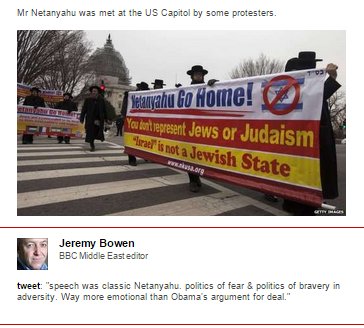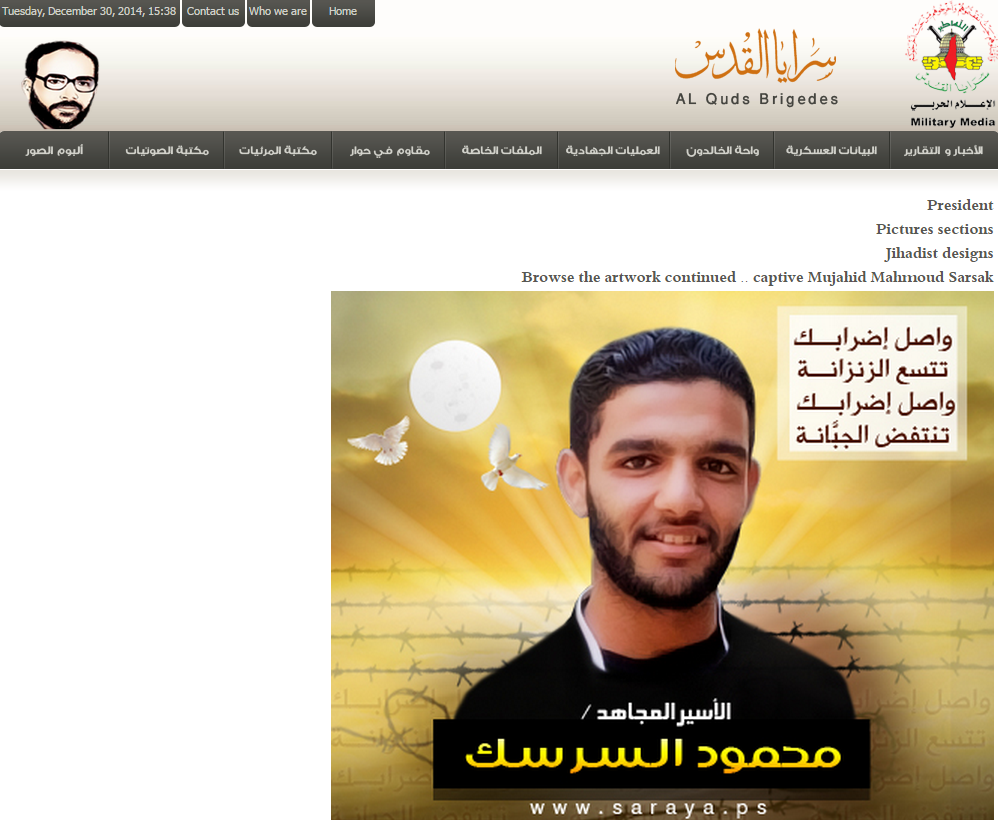On the evening of March 3rd and the morning of March 4th the BBC News website published several reports on the topic of the Israeli prime minister’s speech to the US Congress. One of those was an article including a few selected phrases from the speech – but no complete transcript – titled “Key quotes: Benjamin Netanyahu’s address to Congress“.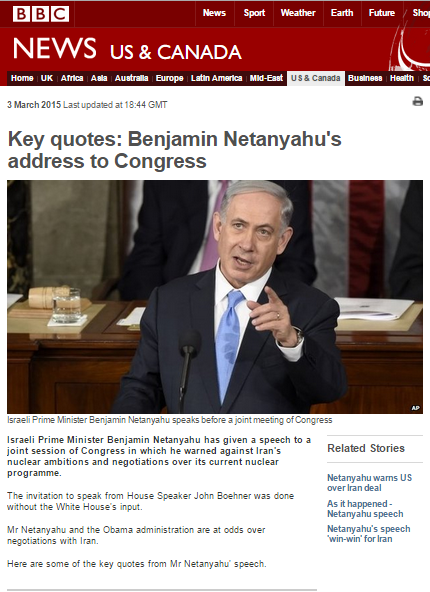
Interestingly, none of what the BBC decided were “key quotes” went any way towards clarifying for audiences the core issues lying behind that speech and so its more important points – such as those below – remained off the radar of BBC audiences.
“While the final deal has not yet been signed, certain elements of any potential deal are now a matter of public record. You don’t need intelligence agencies and secret information to know this. You can Google it.
Absent a dramatic change, we know for sure that any deal with Iran will include two major concessions to Iran.
The first major concession would leave Iran with a vast nuclear infrastructure, providing it with a short break-out time to the bomb. Break-out time is the time it takes to amass enough weapons-grade uranium or plutonium for a nuclear bomb.
According to the deal, not a single nuclear facility would be demolished. Thousands of centrifuges used to enrich uranium would be left spinning. Thousands more would be temporarily disconnected, but not destroyed.
Because Iran’s nuclear program would be left largely intact, Iran’s break-out time would be very short — about a year by U.S. assessment, even shorter by Israel’s.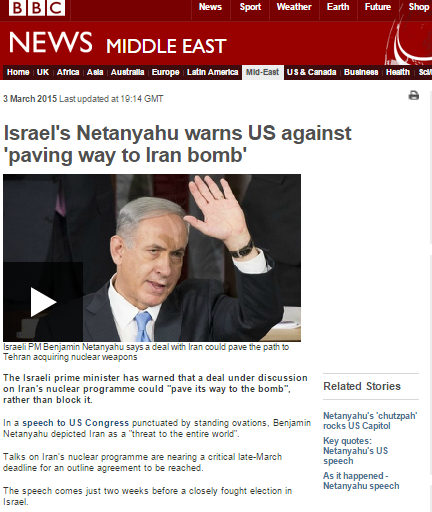
And if – if Iran’s work on advanced centrifuges, faster and faster centrifuges, is not stopped, that break-out time could still be shorter, a lot shorter.
True, certain restrictions would be imposed on Iran’s nuclear program and Iran’s adherence to those restrictions would be supervised by international inspectors. But here’s the problem. You see, inspectors document violations; they don’t stop them.” […]
“The U.N.’s nuclear watchdog agency, the IAEA, said again yesterday that Iran still refuses to come clean about its military nuclear program. Iran was also caught — caught twice, not once, twice — operating secret nuclear facilities in Natanz and Qom, facilities that inspectors didn’t even know existed.
Right now, Iran could be hiding nuclear facilities that we don’t know about, the U.S. and Israel. As the former head of inspections for the IAEA said in 2013, he said, “If there’s no undeclared installation today in Iran, it will be the first time in 20 years that it doesn’t have one.” Iran has proven time and again that it cannot be trusted. And that’s why the first major concession is a source of great concern. It leaves Iran with a vast nuclear infrastructure and relies on inspectors to prevent a breakout. That concession creates a real danger that Iran could get to the bomb by violating the deal.
But the second major concession creates an even greater danger that Iran could get to the bomb by keeping the deal. Because virtually all the restrictions on Iran’s nuclear program will automatically expire in about a decade.”
BBC News website coverage also included a live page which promoted some of the Tweets sent by Jeremy Bowen during the speech and even an image of what were described merely as “some protesters” without any clarification of the fact that the people in the photograph are members of the extremist, Iranian regime-supporting, anti-Zionist Neturei Karta sect.
The BBC News website’s main report was titled “Israel’s Netanyahu warns US against ‘paving way to Iran bomb’“. There readers found ‘analysis’ from Jeremy Bowen which was also reproduced in a later article headlined “Obama says Netanyahu’s Iran speech contains ‘nothing new’“.
In the first of those articles, Bowen’s description of Nancy Pelosi’s remarks was followed by immediate repetition of the same information, with a handy link provided:
A very similar format was used in the second report with the following passages – again with a link – coming immediately after Bowen’s ‘analysis’ :
Also in that second article readers were also informed that:
“Other Democrats criticised the speech, with Representative John Yarmuth calling it “straight out of the Dick Cheney playbook – fear-mongering at its worst”.”
Pelosi’s remarks were also showcased on the above mentioned live page.
The same theme also appeared in an article by the BBC’s North America editor Jon Sopel titled “Netanyahu’s ‘chutzpah’ rocks Capitol and riles Obama“.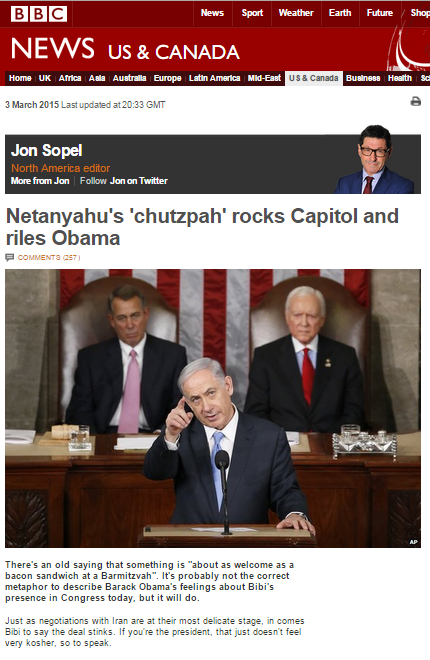
“Some Democrats stayed away, while the leader of Democrats in the House, Nancy Pelosi said: “I was near tears throughout the prime minister’s speech – saddened by the insult to the intelligence of the United States as part of the P5 +1 nations … and saddened by the condescension toward our knowledge of the threat posed by Iran and our broader commitment to preventing nuclear proliferation”.
The words of some administration officials are even more sulphurous. One is quoted today as saying the speech contained “literally not one new idea; not one single concrete alternative; all rhetoric, no action.” “
All of those BBC reports refrained from informing audiences adequately about the many very different reactions to the speech such as the Washington Post editorial which declared in its headline “Obama needs to provide real answers to Netanyahu’s arguments” and the statements from many Representatives – including Ed Royce, Chairman of the House Foreign Affairs Committee, who said:
“Critics must now deal with the substance of the Prime Minister’s concerns, which I have long shared. The Foreign Affairs Committee has consistently raised concerns with the troubling outlines of this agreement. How does an Iran with industrial scale enrichment capacity – key bomb-making technology – make the U.S. and Israel safer? How does an Iranian nuclear program, which will spur similar programs among neighboring rivals, make the Middle East less combustible? How does it make sense for an agreement with a revolutionary regime – that has been in power since 1979 – to expire after just ten years?”
As we see, BBC audiences’ understanding of this story was inevitably influenced by the way in which it was meticulously framed, with information being filtered to avoid the substance of the issue itself and selected reactions to the speech – of one particular political stripe – being pushed to centre stage. The BBC cannot possibly claim that its Middle East editor and additional staff provided the funding public with a comprehensive view of the story which would enhance their understanding of this particular international issue.

